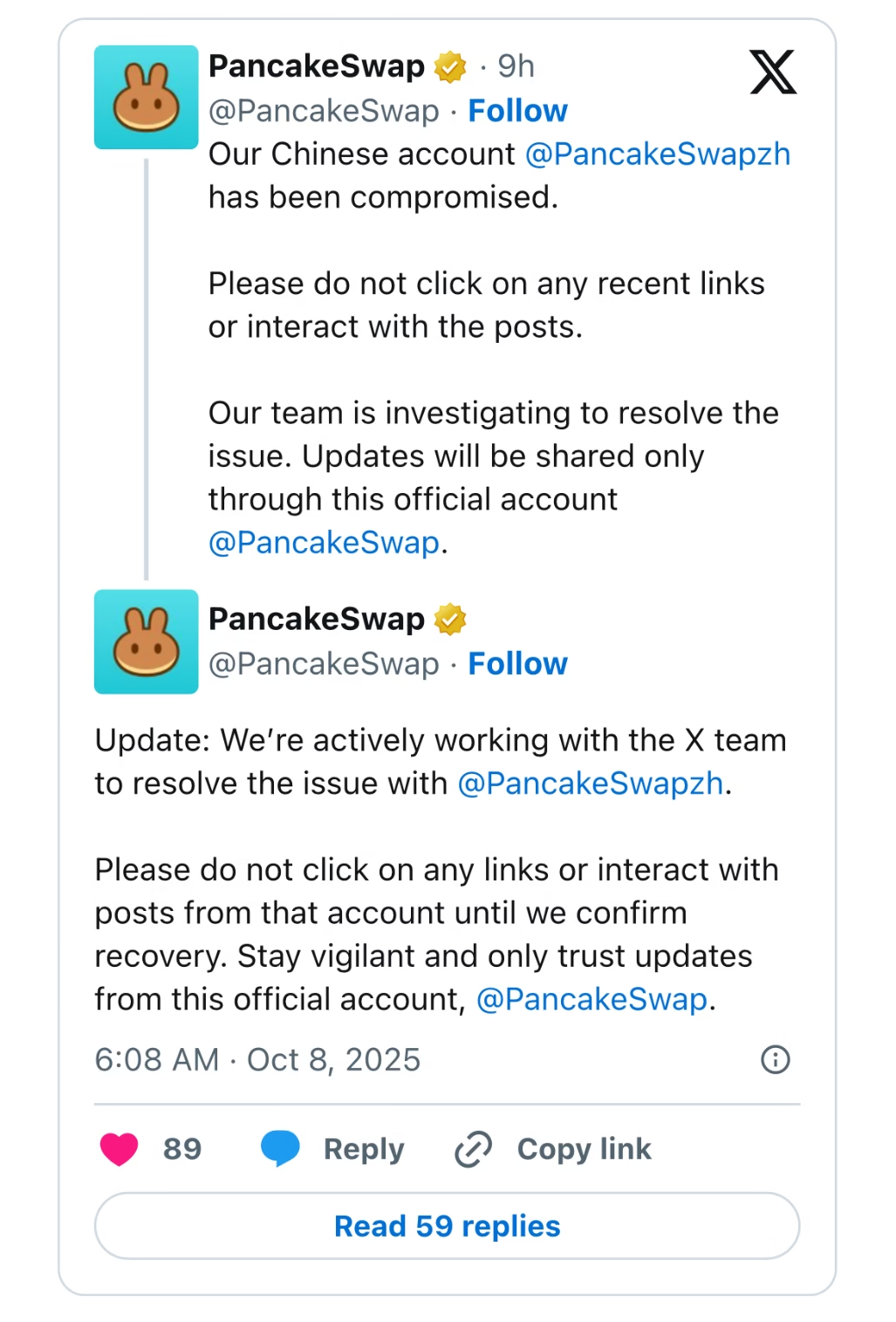PancakeSwap’s Chinese X account (@PancakeSwapzh) was hacked to promote a fake meme coin called Mr Pancake, resulting in about $8,000 in user losses, the decentralized exchange confirmed Tuesday.
The decentralized exchange (DEX) confirmed it is “working closely with the X team to restore control” and has urged users to avoid engaging with any suspicious content from the compromised account.
The Chinese PancakeSwap X account breach comes amid rising social media hacks across major crypto networks. While the attack caused panic among traders initially, the platform emphasized that no core systems or smart contracts were affected.
Paradoxically, CAKE rose 12% to $4.34 in the hours following the breach disclosure, with 24-hour trading volume jumping 80%, according to CoinMarketCap. Analysts attribute the surge to opportunistic trading rather than fundamental sentiment.

“Investor confidence remains relatively intact because users now distinguish between a social media compromise and an on-chain vulnerability,” said Shān Zhang, chief information security officer at SlowMist.
BNB Chain and PancakeSwap targeted in coordinated exploits
The Chinese PancakeSwap X account hack follows closely after the BNB Chain X account breach, which was used to distribute malicious reward links. Binance co-founder Changpeng Zhao (CZ) urged followers to “never click on unverified links” while confirming that investigations were underway.
In the PancakeSwap case, losses were limited roughly $8,000 in total with one victim reportedly losing $6,500 due to malicious posts shared from the Chinese PancakeSwap X account. Although the breach was contained quickly, security experts warn that the incident mirrors a broader pattern of phishing-style infiltration across the Web3 ecosystem.
The rise of meme coin hype on BNB-related platforms makes them perfect targets for cybercriminals, Zhang, SlowMist.
We’re seeing coordinated attempts to exploit large user bases through seemingly legitimate promotions on verified accounts.
According to SlowMist, many social media administrators within crypto firms maintain weak operational security often using unsecured personal devices or failing to enable multi-factor authentication. The firm urged all digital asset organizations to enforce strict credential management and provide cyber-awareness training to prevent future attacks.
AI tools intensify the wave of social media crypto scams
Experts say the Chinese PancakeSwap X account breach underscores a troubling trend: AI-powered fraud. Similar cases include Instagram compromises of celebrity and brand accounts such as Adele, Future, and FC Barcelona, which were used to promote fake Solana-based meme coins.
AI-driven scams are evolving faster than most platforms can respond, Slava Demchuk, CEO, AMLBot.
Attackers now automate social engineering, impersonate legitimate brands, and deploy bots to trick users at scale.
A recent Kaspersky report confirms that cybercriminals are leveraging large language models (LLMs) and AI-generated deepfakes to create near-perfect phishing campaigns. These include voice cloning, fake videos, and realistic social posts used to lure victims into connecting wallets or signing fraudulent transactions.
The report also reveals a pivot toward stealing immutable identifiers such as biometric data and voice signatures over passwords, signaling a dangerous evolution in phishing strategies.
Human error remains crypto’s biggest security flaw
The Chinese PancakeSwap X account compromise once again exposes how the human element remains the weakest link in cybersecurity chains. Even as blockchain networks achieve greater technical resilience, social engineering continues to bypass advanced systems by targeting staff directly.
Technology can’t fully protect against poor judgment, Alex Katz, CEO, Kerberus Cybersecurity.
From developers to social media teams, everyone in crypto must assume they’re a potential entry point.
Katz emphasizes that continuous security education is critical, especially for Web3 organizations operating across multilingual teams and regional markets like Asia. The Chinese PancakeSwap X account incident, he says, “should be a wake-up call that trust verification and credential compartmentalization are non-negotiable in crypto communications.”
Growing regulatory and industry responses
Authorities in multiple jurisdictions, including the UK’s National Cyber Security Centre and the U.S. Cybersecurity and Infrastructure Security Agency (CISA), have issued new guidelines urging firms to secure verified accounts with hardware-based authentication and automated breach monitoring tools.
In response, PancakeSwap has announced plans to implement stronger account access protocols, including hardware-based multi-factor authentication and enhanced internal training for administrators managing official pages.
Meanwhile, BNB Chain has reportedly rolled out an internal “PhishGuard” initiative to monitor for coordinated scam campaigns targeting its ecosystem on social platforms.
As the Chinese PancakeSwap X account is restored, experts agree the crypto industry must adapt faster to emerging threats, especially as AI-driven attacks blur the line between human trust and machine deception.

Leave a Reply